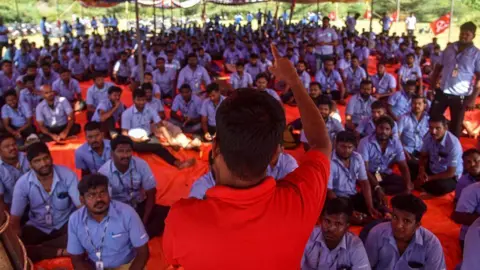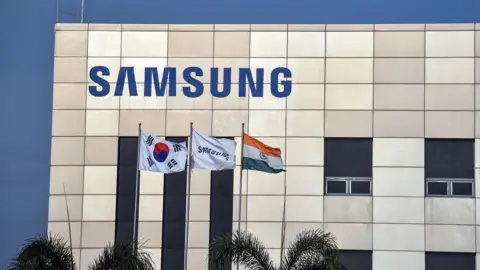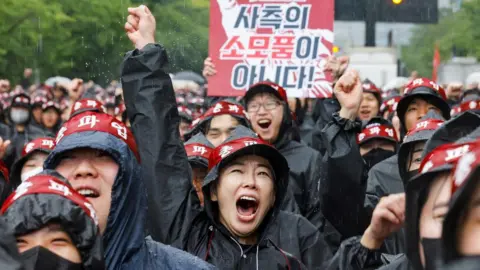 Reuters
ReutersFor the previous 11 days, about 1,500 employees of South Korean know-how large Samsung Electronics have been placing work within the southern Indian state of Tamil Nadu, resulting in main disruptions in manufacturing.
The plant in Chennai metropolis, one in every of Samsung’s two factories in India, employs almost 2,000 employees and produces residence home equipment, contributing a couple of third to the corporate’s annual $12bn (£9bn) income in India.
The placing employees collect at a plot of land close to the 17-year-old manufacturing facility each day, demanding that Samsung recognise their newly-formed labour union – the Samsung India Labour Welfare Union (SILWU). They are saying that solely a union may help them negotiate higher wages and dealing hours with the administration.
The protest, one of many largest Samsung has seen lately, comes at the same time as Prime Minister Narendra Modi has been courting overseas funding by positioning India as a viable different to China for manufacturing actions.
Samsung India has launched a press release saying that the welfare of its employees was its prime precedence. “We now have initiated discussions with our employees on the Chennai plant to resolve all points on the earliest,” it stated.
Hours earlier, the police had detained round 104 employees for endeavor a protest march with out permission. The protesters have been launched within the night.
“The employees have determined to strike work indefinitely until their calls for are met,” stated A Soundararajan, member of Centre of Indian Commerce Unions (Citu), backed by the Communist Celebration of India (Marxist). Citu has backed the brand new union within the manufacturing facility.
The employees have three key calls for: Samsung should recognise the brand new union, permit collective bargaining, and reject competing unions as about 90% of the workforce belongs to SILWU, stated Mr Soundararajan.
 Reuters
ReutersEmployees, incomes a median of 25,000 rupees ($298; £226) a month, are demanding staggered raises totalling a 50% improve over the subsequent three years, in keeping with Citu.
Citu additionally alleged that employees on the plant have been being “pressurised to complete every product – like a fridge, washer, or TV – inside 10-15 seconds”, work continuous for 4 to 5 hours at a stretch, and do their jobs in unsafe situations.
Mr Soundararajan additionally alleged that employees have been pressurised by the administration to depart the brand new union and that their households have been threatened as properly.
The BBC has despatched Samsung India an in depth set of questions for a response.
In the meantime, Tamil Nadu’s Labour Welfare Minister CV Ganesan stated he had assured union officers that talks have been underneath option to resolve their points. “We are going to fulfil the calls for of the employees,” he stated.
Sijo*, a protester, stated that he arrives on the protest website each day at 08:00 IST (02:30 GMT) and stays till 17:00, becoming a member of lots of of employees of their blue Samsung India uniforms.
The union arranges for lunch and water for the protesters, whereas a makeshift fabric tent protects them from the weather. There are not any washroom services, so the employees use the outside.
“For the reason that manufacturing facility was arrange, staff have been working with out complaints or a union. However issues have been getting unhealthy over the previous couple of years, and now, we’d like the assist of a union,” Sijo stated.
He added that his pay does not maintain tempo with the price of dwelling and that this has put a pressure of his household’s funds.
Up till 2020, the Samsung Group was known for not allowing unions to symbolize its employees. However issues modified after the corporate got here underneath intense public scrutiny after its chairman was prosecuted for market manipulation and bribery.
 Reuters
ReutersHundreds of thousands of Indian employees be a part of commerce unions – usually backed by leftist events – who use their political clout to implement labour legal guidelines and negotiate higher situations. “Overseas firms arrange in India however resist following native legal guidelines on employees’ rights to affiliation and collective bargaining,” alleged Mr Soundararajan.
Many outstanding multinational firms, together with Apple and Amazon, have arrange factories in India. However labour rights activists allege that a lot of them underpay and overwork their Indian staff and collude with state governments to clamp down on employees’ rights.
Shyam Sundar, a labour economist, stated multinational companies use numerous “human useful resource methods” to stop employees from forming unions in growing international locations like India.
For one, they fiercely oppose employees becoming a member of exterior, politically-backed unions and encourage them to type “worker-led” inner ones. “This ensures that the administration has some management over the union’s actions,” Mr Sundar stated.
Mr Soundararajan alleged that administration on the Chennai plant had additionally approached employees with this resolution, which they refused. The BBC has reached out to Samsung India for a response.
The second approach, Mr Sundar stated, is by hiring younger, unskilled employees, particularly from rural areas, by attracting them with a superb beginning wage. “These ‘trainees’ are promised to be made everlasting staff after a few months, however this does not occur. The salaries too keep stagnant or have very low increments.”
The fast progress of “versatile employees” – staff employed on contract – has turn out to be a key technique of multinational companies to cease unionising by guaranteeing a pliant workforce, he added.
In line with the newest authorities statistics, every two in five workers employed in factories in India in 2022 have been contractual labourers, making up about 40% of the workforce in industrial institutions.
“Corporations use the specter of re-location or non-expansion to discourage state governments from implementing labour legal guidelines,” Mr Sundar stated. “However employees can leverage world labour unions to strain firms to abide by worldwide labour legal guidelines,” he added.
*Title modified to guard the employee’s identification
With inputs from Vijayanand Arumugam from BBC Tamil and Nikhil Inamdar from BBC Information

